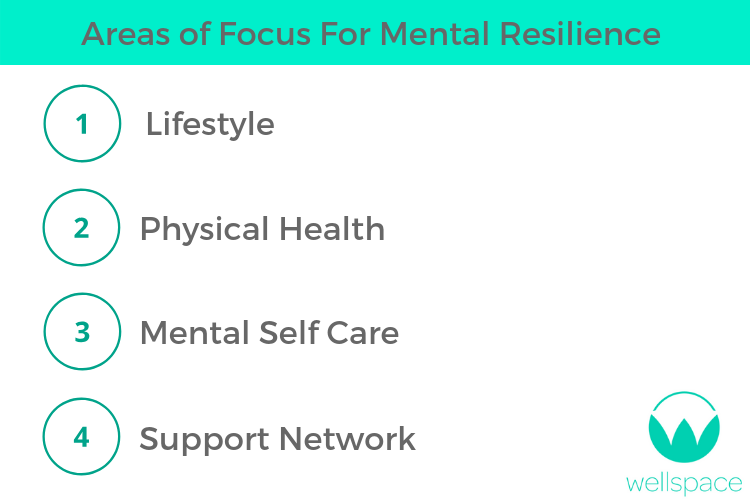As part of our Three Pillars of Health series, we are looking at mental resilience and how it can be nurtured and developed.
This blog will focus on ways in which you and your staff can support their mental wellbeing and develop a resilience to stress.
What is Mental Resilience?

Mental resilience is the ability to weather a period of stress or challenge and then return to normal.
Stress is something that we cannot eradicate in our lives, as it is a natural reaction to a challenging situation. And the things that stress us will vary as our experiences and abilities change.
Stress puts our body into a state of readiness. Adrenaline is released, we become focused and alert; our body and mind are ready to flee from or fight the danger. Or, in reality get a large project over the line.
Our modern lives will trigger this primal response, and it can be difficult to switch it off. Over time, the extra adrenaline increases our blood pressure, makes it difficult to sleep, affects our appetite, and makes it difficult to feel restful and at ease. Long term stress can lead to physical and mental illnesses.
Mental resilience is not about stopping the body’s natural response to stress. Rather, it is about enabling us to recognise when the stressor has passed and enabling us to return our body and mind to a more relaxed state.
How Does Mental Resilience Benefit Our Working Lives?
 It is unrealistic to hope that one day all our stresses will be gone. That promotion or pay rise will not make a difference to how stressed you are.
It is unrealistic to hope that one day all our stresses will be gone. That promotion or pay rise will not make a difference to how stressed you are.
But learning to recognise, manage, and recover from stress will make periods of stress less impactful.
Most of us have been in a situation where we still feel anxious, fired up, or restless long after the project is in or the challenge has passed. That wonderful feeling of relief we were hoping for just never seems to come.
This can make it difficult to go about every day tasks with the same vigour as before. It can cause mistakes, tiredness, a general lack of enthusiasm, and even physical and mental illness.
When you or your employees have limited mental resilience, the business can suffer.
Staff might have more absences or instances of sickness. They might decide a change of job is what they need, or they might just become less innovative, diligent, and productive.
Your once wonderful team will disappear before your eyes.
How To Build Up Mental Resilience
Building up mental resilience is about ensuring your mind is generally well before the stressor occurs. However, it’s not always possible to know when there is something stressful on the horizon. Practising good mental wellbeing generally is a reliable way of making sure that when you are stressed you can weather it and bounce back.
National mental health charity, Mind, recognise four areas to work on for overall mental resilience:

1) Lifestyle
Get your lifestyle to work for you, rather than the other way around by figuring out what makes you happy and doing more of that and less of what makes you miserable.
Make time for your favourite friends, hobbies, and interests and don’t feel bad for saying no to anything that is burdensome or stressful. Especially, if people are making unfair demands on your time.
Find ways to relax and build them into your routine, whether it is walking the dog, cooking a lovely meal, watching a film, or even doing something physical. Building these little relaxation treats into your lifestyle will help you feel more mentally resilient.
This article by Simply Business has some great ideas for micro holidays to help you escape. Brussels, anyone?
2) Physical Health
Physical activity drenches the brain in endorphins and helps to regulate the blood pressure and heart beat, which makes it easier to deal with stress. It can be difficult to motivate yourself to do exercise if you are stressed, and for some it isn’t possible. Small changes to your overall activity can make a real difference though.
Taking the stairs instead of the lift at work, having a walk around the block at lunch, or even standing up every 20 minutes can be really beneficial to your overall health. The Wellspace app encourages the increase in activity by setting your position on a leader board and letting you and your team compete against colleagues for rewards.
The Wellspace app also allows you to track your sleep patterns so you can see what is affecting your sleep quality. As we all have experienced, it is so difficult to maintain a positive, rational outlook when you are tired. Plenty of good quality sleep is vital to your overall wellbeing.
Proper nutrition is also vital to overall mental resilience and wellbeing-you can read more about that in our Three Pillars of Wellbeing-Nutrition blog here. Make sure you are eating a healthy balance of food and aren’t relying on alcohol or cigarettes to get you through a stressful time. That is a slippery slope that in no way reduces stress or the effects.
3) Mental Self Care
Give yourself a break. Literally.
Try to give yourself some time to unwind, whether that is going away for a fortnight in the sun or simply shutting yourself in your room for 10 minutes to lie back and practice some meditation or mindfulness.
Regularly giving yourself time to relax is critical, as is forgiving yourself.
It is so easy to berate yourself for making mistakes or saying or doing the wrong thing. And it can really eat you up inside. Learn to forgive yourself and your mental resilience and general wellbeing will benefit.
Be mindful of how you are feeling and the triggers. The Wellspace app, for example, encourages you to record how you are feeling on a daily basis and rewards you for engagement. Anxiety and depression can sometimes creep up on you so being aware of how you are feeling and why is important.
4) Build a Support Network
 A friendly shoulder to cry on when you need it is a wonderful thing. But try to make your support network a bit more structured than that.
A friendly shoulder to cry on when you need it is a wonderful thing. But try to make your support network a bit more structured than that.
Counselling services are no longer reserved for those with money to spare. You can set up free counselling services for your employees without too much expenditure or fuss. Counselling teaches us ways of dealing with stress and allows us to build up our mental resilience.
There is also an abundance of fantastic self-help advice on line and in support groups. The Stress Management Society website, for example, is full of useful assessments and resources.
Mind have some great resources and run courses to help you protect your mental resilience. Have a look here for further information.
However you do it, feeling supported is an important step in securing your long term mental resilience.
Get In Touch
If you would like to chat with one of our team of experts about how to build the mental resilience of either yourself or your workforce, please don’t hesitate to get in touch on info@yourwellspace.com or fill in your details here. We will get straight back to you.
Or, you can read more about mental resilience here.










